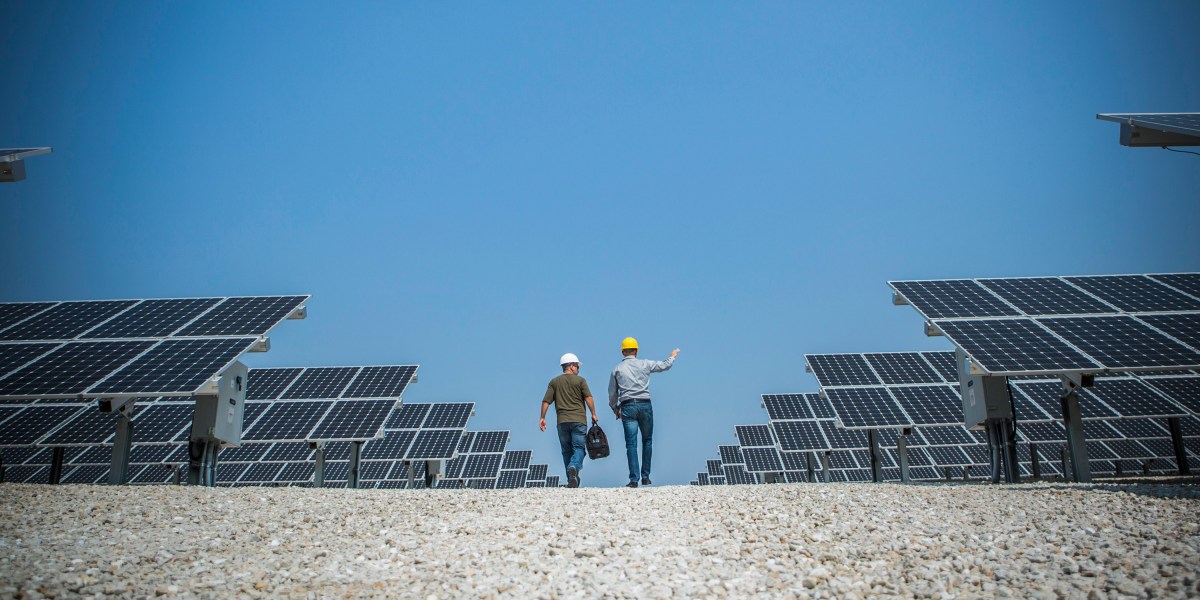The Download: talking driverless cars, and updated covid vaccines
This is today’s edition of The Download, our weekday newsletter that provides a daily dose of what’s going on in the world of technology.
This driverless car company is using chatbots to make its vehicles smarter
The news: Self-driving car startup Wayve can now interrogate its vehicles, asking them questions about their driving decisions—and getting answers back thanks to a chatbot.
How it works: The idea is to use the same tech behind ChatGPT to help train driverless cars. The company combined its existing self-driving software with a large language model, creating a hybrid model that syncs up video data and driving data with natural-language descriptions that capture what the car sees and what it does.
Why it matters: Wayve is treating the news as a breakthrough in AI safety. By quizzing its self-driving software every step of the way, Wayve hopes to understand exactly why and how its cars make certain decisions—and to uncover mistakes more quickly. Read the full story.
—Will Douglas Heaven
Who benefits most from the new covid vaccines?
Covid case numbers are rising across the United States. So the news that updated covid vaccines are finally available comes as a relief to many. These shots, which target an omicron variant known as XBB, hit some pharmacies earlier this week, with more on the way.
The US Centers for Disease Control and Prevention has recommended that everyone six months or older get the new vaccine. The announcement has once again sparked a debate about who should get vaccinated, and who will benefit most from the new formulation.
While experts agree that older adults, people who are immunocompromised, and those with multiple underlying conditions will benefit the most from a booster, they’re less certain about other groups. Read the full story.
—Cassandra Willyard
AI just beat a human test for creativity. What does that even mean?
AI is getting better at passing tests designed to measure human creativity. In a study published in Scientific Reports, AI chatbots achieved higher average scores than humans in the Alternate Uses Task, a test commonly used to assess this ability.
This study will add fuel to an ongoing debate among AI researchers about what it even means for a computer to pass tests devised for humans. The findings do not necessarily indicate that AIs are developing an ability to do something uniquely human. It could just be that AIs can pass creativity tests, not that they’re actually creative in the way we understand. However, research like this might give us a better understanding of how humans and machines approach creative tasks. Read the full story.
—Rhiannon Williams
AI can help screen for cancer but there’s a catch
Plenty of headlines in the past few months promise AI will revolutionize cancer detection. Just last week Microsoft announced that it will build the world’s largest image-based AI model for identifying cancer. Last month, the first clinical trial of AI-supported breast cancer screening found that an AI-supported model detected 20% more cancers in comparison to human experts working without AI.
That sounds like a good thing. In theory, catching cancers earlier should make them easier to treat, saving lives. But that’s not always what the data shows. Screening is only one part of the puzzle, and in some cases, it can actually cause harm. Read the full story.
—Cassandra Willyard
This story is from The Checkup, MIT Technology Review’s weekly newsletter giving you the inside track on all things biotech. Sign up to receive it in your inbox every Thursday.
The must-reads
I’ve combed the internet to find you today’s most fun/important/scary/fascinating stories about technology.
1 The Biden administration wants to talk to social media firms again
Supreme Court Justice Alito responded by extending the strict comms ban. (CNN)
+ The court ruling prevents officials from coercing platforms to delete content. (NYT $)
+ Biden officials have been accused of violating the First Amendment. (WP $)
2 The secret behind Google’s search dominance? Habit.
Web users are reluctant to try new things, a blockbuster antitrust trial has heard. (Bloomberg $)
+ In a separate case, Google’s paying a $39 million settlement. (The Guardian)
3 Abortion care is resuming in Wisconsin
Even though no one’s fully sure if it’s legal. (Vox)
+ Texas is trying out new tactics to restrict access to abortion pills online. (MIT Technology Review)
4 College students are working on AI text-detection tools
The problem is, they’re easily confused and prone to errors. (Wired $)
+ AI-text detection tools are really easy to fool. (MIT Technology Review)
5 The US has failed to develop hi-tech supersonic missiles
Now China and Russia’s sophisticated weapons have US officials worried. (WSJ $)
6 Our kids are constantly surveilled online
It’s up to adults to protect them—including on social media. (The Atlantic $)
7 NASA wants more robust data to search for UFOs 
Enter the citizen scientists. (FT $)
+ Its new UFO Chief should be able to help. (Bloomberg $)
+ The UFO investigation report makes for interesting reading. (Motherboard)
+ Future space food could be made from astronaut breath. (MIT Technology Review)
8 The James Webb Space Telescope is inspiring artists
Its awe-inspiring photographs are fueling the new generation of video art. (New Yorker $)
+ How the James Webb Space Telescope broke the universe. (MIT Technology Review)
9 The internet is fixated on ancient Rome 
There’s much amusement over how often men think about it. (WP $)
10 It’s official: we’re all getting hotter
We’re living longer, but we’re also looking better while we’re doing it. (Proto.Life)
+ How scientists want to make you young again. (MIT Technology Review)
Quote of the day
“I’m broke and wearing an ankle monitor and one of the most hated people in the world.”
—Sam Bankman-Fried, the disgraced crypto founder, reflects on life in home detention earlier this year in a series of unsent tweets shared with the New York Times.
The big story
How greed and corruption blew up South Korea’s nuclear industry
April 2019
In March 2011, South Korean president Lee Myung-bak presided over a groundbreaking ceremony for a construction project between his country and the United Arab Emirates. At the time, the plant was the single biggest nuclear reactor deal in history.
But less than a decade later, Korea is dismantling its nuclear industry, shutting down older reactors and scrapping plans for new ones. State energy companies are being shifted toward renewables. What went wrong? Read the full story.
—Max S. Kim
We can still have nice things
A place for comfort, fun and distraction in these weird times. (Got any ideas? Drop me a line or tweet ’em at me.)
+ Keep your eyes peeled for the green comet Nishimura this week—it was only discovered a month ago, after all. 
+ Can you guess which celebrity scrawls their name like this?
+ This new wedding cake-style pavilion in the UK is delightfully bonkers.
+ This curry house cover of Mr Brightside deserves all the awards.
+ Who knew the Addams Family’s home was quite so colorful?


